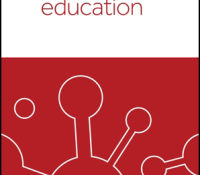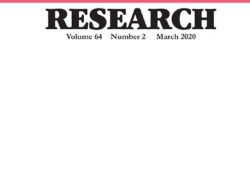eric.ed.gov har udgivet: This study aims to determine the attitudes of prospective teachers of Secondary Mathematics Education toward Instructional Technologies and Material Development (ITMD) Course. The participants of this descriptive research include 44 students, who take ITMD Course at Department of Secondary Mathematics at Necatibey Faculty of Education in Balikesir University. The questionnaire developed by researchers was conducted before and after the course at 2007-2008 fall semesters. The accuracy of the difference in the attitudes of the prospective math teachers before and after the course was tested by t test and it was seen to be statically significant in the level of p=0.05. Moreover, according to results of the interviews, the prospective teachers emphasized that ITMD Course aims to provide permanent learning and to prepare materials that are appropriate to… Continue Reading →
Like this:
Like Loading...
eric.ed.gov har udgivet: The purpose of the study was to examine and describe the attitudes of Turkish early childhood children in science. This study explored the causal factors that influence children’s attitudes toward science such as teachers‛ years of teaching experiences, frequency of teaching science in a week, and teachers‛ teaching style. Turkish children (N=44) who live in the United States and engage in early childhood classroom involved into the study. Preschool teachers who had Turkish children in their classroom completed a survey for giving information about their Turkish children experiences in their science teaching activities. The Child’s Attitude Toward Science (CATS) survey which was developed by researchers was used while collecting data. The results showed that Turkish children have positive attitudes towards science especially in Life Science Topics. The… Continue Reading →
Like this:
Like Loading...
eric.ed.gov har udgivet: What are high school students thinking? The purpose of this study was to examine the degree that psychosocial attitudes affect academic achievement in mathematics for students of different races during secondary schooling. Based on a quantitative methodology, data was gathered from a nationally distributed survey involving over 16,000 student participants under the auspices of the National Center for Education Statistics (NCES). Transcript information was incorporated into the analysis, so student math attitudes and student racial profiles could be correlated to courses taken and grades. Significant differences were found when comparing Latina/o to non-Latina/o students with regard to student self-evaluations of mathematics affinity, appreciation and capacity. Subsequent analyses revealed that Latina/os are significantly less prepared than their non-Latina/o peers in terms of the highest level of math course… Continue Reading →
Like this:
Like Loading...
tandfonline.com har udgivet en rapport under søgningen „Teacher Education Mathematics‟: Abstract Abstract For the advancement of current and future economic and overall well-being to occur, STEM professionals are highly needed. STEM education is an approach that integrates science, technology, engineering and mathematics curricula into one interdisciplinary curriculum. In the context of STEM education, learners acquire deep and critical thinking abilities, which help them become creative and analytic thinkers, and hence innovators in their careers. For this to happen, the teacher must be trained to successfully design and effectively teach an integrated STEM curriculum. The purpose of this study was to analyze Saudi Arabian science and mathematics teachers’ attitudes toward integrating Science, Technology, Engineering and Mathematics (STEM) in teaching before and after they participated in a short professional development program focused… Continue Reading →
Like this:
Like Loading...
tandfonline.com har udgivet en rapport under søgningen „Teacher Education Mathematics‟: ABSTRACT ABSTRACT This paper analyzes the impact of a Course Transformation process based on a Flipped Classroom strategy on Chilean Engineering students’ attitudes toward university-level mathematics. The Attitudes Toward Mathematics Inventory (ATMI) questionnaire was applied as both pre- and post-test to 76 students in three mathematic courses (Calculus I, Calculus II and Elements of Algebra for Computing) at Universidad Católica de Temuco’s Faculty of Engineering which adopted a flipped classroom method. The results showed a significant positive change in the perceived value of mathematics in the four ATMI categories (P < 0.05) with different effect sizes after the implementation of the flipped classroom and active learning strategies. The results suggest that the implementation of transformed courses using a Flipped Classroom method has a… Continue Reading →
Like this:
Like Loading...
tandfonline.com har udgivet en rapport under søgningen „Teacher Education Mathematics‟: ABSTRACT ABSTRACT Positive teacher attitudes are essential for success when children with special educational needs (SEN) are placed into mainstream classrooms. The present study surveyed teachers’ attitudes towards inclusion by using a large national sample and Teachers’ Attitudes towards Inclusion Scale (TAIS). A total of 1,764 Finnish basic-school teachers participated in the e-mail survey. They included 824 classroom teachers, 575 subject teachers and 365 special-education teachers. The classroom teachers scored below and the subject teachers significantly below, the neutral midpoint of the scale. The special-education teachers’ mean scores were above the midpoint. About 20% of teachers were strong opponents of inclusion, and 8% were strong advocates. The attitudes towards inclusion had only weak associations with variables other than the teacher… Continue Reading →
Like this:
Like Loading...
eric.ed.gov har udgivet: In this study a survey instrument was developed to test elementary teachers‛ attitudes towards incorporating manipulatives in their math lessons frequently. Though the benefits of using math manipulatives has been reported, there seems to be a disconnect between the benefits of manipulative use and the number of teachers integrating them in their lessons on a daily basis. In this study a total of 22 regular education teachers in kindergarten through sixth grade and five learning support teachers in grades first through sixth from a rural elementary school were given a survey instrument to test its validity and reveal some trends in teachers‛ views on manipulative use as well as possible causation for their views. Findings from the study show that though many teachers feel comfortable using and… Continue Reading →
Like this:
Like Loading...

tandfonline.com har udgivet en rapport under søgningen „Teacher Education Mathematics‟: Abstract Abstract Motivated by experience with students’ psychological barriers to learning statistics, we modified and extended the Statistical Anxiety Rating Scale (STARS) to develop a contemporary and valid (face, content, criterion and construct) Danish measure of attitudes and relationship towards statistics for use with higher education students taking statistics within another discipline. Two subscales were excluded because of lack of conceptual unidimensionality or derogatory content, and single items were modified for face and content validity enhancement in the remaining subscales. Following a pilot study and main study, the resulting 26-item Danish instrument (HFS-R for “holdninger og forhold til statistik – Revideret”, in English “Attitudes and Relationship to Statistics – Revised”) consists of four subscales: Test and Class Anxiety (TCA), Interpretation… Continue Reading →
Like this:
Like Loading...
eric.ed.gov har udgivet: Recently much have been invested in the interactive whiteboard educational technology in Turkey. The government is still wishful to spread it to schools of all levels. This study tries to understand teachers‛ and students‛ attitudes toward interactive whiteboard technology along with differences in attitudes resulting from some demographic factors. Two parallel surveys consisting of 25 items were applied to 255 students and 23 teachers from three private schools. Students from sixth to twelfth grades and teachers from 15 different branches participated in this research study. The results indicate that interactive whiteboards are highly rated by both teachers and students. Students mostly prefer the usage of interactive whiteboards in math courses, and their attitudes differ across their genders and school levels. As students get elder, their positive attitudes… Continue Reading →
Like this:
Like Loading...
eric.ed.gov har udgivet: This study examines the problem of underachievement among gifted high school students. Low achievers were compared to high and moderate achievers on their motivation, self-regulation, and attitudes toward their school and teachers. Participants were all highly able students from grades 10 and 11 in an academically selective gifted high school in Australia (n=197). Teachers were asked to rank the students into high, moderate, and low achievers in terms of their performance in two subjects English and Mathematics. Participants were asked to respond to two surveys that measured their personality characteristics. The results indicate that math achievement and not language achievement may be used with confidence to classify gifted students; high achiever had higher mean scores than moderate and low achievers on all study variables; intrinsic motivation then… Continue Reading →
Like this:
Like Loading...



